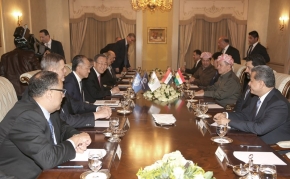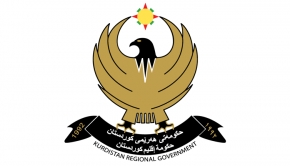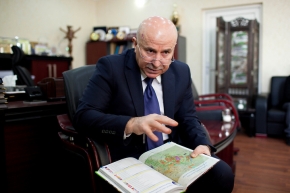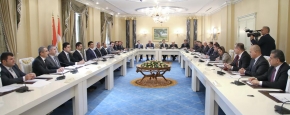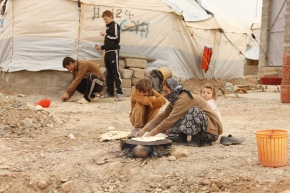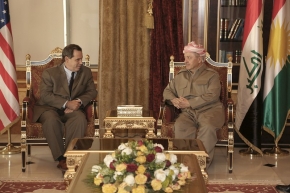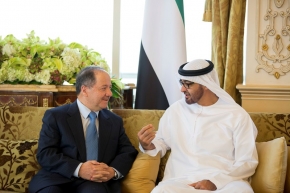Presient Masoud Barzani welcomed the Secretary General of the United Nations, Mr. Ban Ki-moon, the President of the World Bank, Mr. Jim Yong Kim, and President of the Islamic Development Bank. Mr Ahmad Mohamed Ali Al-Madani, in Erbil today to discuss the latest developments concerning the ongoing efforts to defeat ISIS terrorists, the humanitarian situation of IDPs and Syrian refugees in Kurdistan, and the financial challenges faced by the KRG.
The two sides also spoke of the Kurdistan Region's management of the affairs of the refugees from Syria and the IDPs from other parts of Iraq who have found in the Kurdistan region a safe haven. The Secretary General expressed his appreciation for the role of the Kurdistan Region for providing the necessary support and protection of the IDPs amd refugees. He also lauded the bravery and sacrifices of the peshmerga forces in taking the fight to ISIS terrorists, and the leadership of President Barzani.
Mr. Jim Yong Kim, President of the World Bank, highlighted the steps taken by the World Bank to help the KRG and expressed his approval for the reform plans announced by the KRG to ease the financial crisis.
Without a significant increase in funding from the International Community and financial transactions from Government of Iraq, the Kurdistan Region will not be able to contain the humanitarian crisis.
The Kurdistan Regional Government has long adopted an inclusive and welcoming policy free of discrimination based on religious, cultural, ethnic or political identity. We recognize the vital importance of aiding those that are fleeing violence and unrest from other parts of Iraq in order to establish and maintain peace in this conflict-ridden area.
Kurdistan Region as a Safe Haven
From 2003 up until 2013, KRI opened its doors to more than 600,000 internally displaced Iraqis. The Government and the people of the Kurdistan Region understood that sustainable peace and development cannot be accomplished if some members of society are marginalized, and so we championed for inclusiveness by ensuring that these new members of our society were granted the same rights, protections and access to services.
Today, the Syrian civil war has produced one of the largest displacement crisis in the world and a significant number of Syrians fleeing violence have sought safety and shelter in the Kurdistan Region. In a sudden escalation of violence, the brutal invasion of the Islamic State in 2014 resulted in the forced displacement of three million Iraqis. The situation has rapidly developed into a full scale level-three humanitarian crisis. Offering protection and shelter, the Kurdistan Region once again became a safe haven for more than half of the displaced population and we have continued to keep our borders open.
Today, the Kurdistan Region is offering safety, protection and services to 280,000 Syrian refugees and up to 1.5 million IDPs. In 2014, an average of 80,000 IDPs entered the Kurdistan Region every month. These figures exclude the displaced populations served by the KRG in the neighboring provinces. As a result of multiple waves of displacement, the population of the Kurdistan Region has increased by almost 30%, placing immense pressure on existing resources and services. While the nature of the crisis challenges our ability to collect exact displacement figures, the number is significant enough to raise acute emergency alarms.
Containing an Extended Level-Three Crisis
The Government of Iraq has unconstitutionally withheld KRG’s 17% share of the annual budget for the past 17 months. This has crippled the KRG’s ability to maintain public services for the local population and meet the basic needs of the IDPs. Confronted with the trifecta of crises – loss of 90% of the fiscal transfers, the refugee and IDP crises and the war on ISIS – KRG cannot maintain its level of contribution and open-door policy without putting the safety and welfare of the population and stability of the Region at risk. Whilst the initial consequences are apparent, the full scale of the impacts is still unfolding due to the on-going nature and magnitude of the conflict. Up to date, the KRG has managed to contain the crisis and meet the basic needs of the affected populations with the assistance of UN Agencies and national and international NGOs. Yet the heaviest burden has been borne by the host communities, whose living standards, access to services and opportunities have drastically deteriorated over the past few years. Regrettably, the GoI has remained largely absent in the response to the IDP crisis in the Kurdistan Region despite its constitutional duty to its displaced citizens.
Contingency and Preparedness
In one of the world’s most complex humanitarian crisis, the KRG and humanitarian partners on the ground are challenged to meet the deepening needs of a population in protracted displacement, while also responding to new emergencies and influxes. The military operations and subsequent displacements from Anbar have offered an insight into the likely outcomes of the anticipated liberation of Mosul. The worst case scenario is warning of the displacement of one million people. Based on previous displacement trends, geographic proximity, safety and security in the Kurdistan Region and the restricted access policies of other provinces in Iraq, the majority of the new IDPs will more than likely flee to the Kurdistan Region.
Preventing Regional Collapse
Over the past years, the refugee and IDP response plans have remained chronically underfunded. At its conclusion, the Strategic Response Plan had been funded at 26% while the corresponding figure for the Refugee Response stands at an alarming 19%. Adding to this pressured funding situation, the GoI has not only lacked in providing assistance but has also withheld KRGs share of the national budget. In the recently launched Humanitarian Response Plan (HRP), the humanitarian community has appealed for $500 million. If funded, the HRP will alleviate acute suffering but fall short of tackling the impact on host communities and society at large. A recent report published by the World Bank and the Ministry of Planning estimates the cost of stabilising the region back to the pre-crisis level at $1.4 billion under the baseline scenario, in which no new influx of displaced populations enter the Kurdistan Region. In the worst-case scenario, the World Bank and MoP have estimated a staggering need of $2.4 billion for stabilization costs. It is the regrettable conclusion of the KRG that without a drastic increase in funding from the international community and financial transactions from the GoI, the Region will neither be able to cope with the current crisis, nor respond to anticipated new displacements. As humanitarian partners formulate contingency plans, it is paramount to recognize that the Kurdistan Region has exhausted its response and absorption capacity and is at risk of total collapse. KRG remains committed to its humanitarian responsibilities and will continue to voice the plight of the women, men and children in distress. We are calling on the international community and the GoI to provide the region with the necessary resources and technical support to continue offering a safe haven to those in need.
Erbil, Kurdistan Region, Iraq (cabinet.gov.krd) - Erbil Governor, Nawzad Hadi, denied that accommodating the large number of internally displaced persons, IDPs, and refugees poses a security threat to the Kurdistan Region.
In an interview with Kurdistan Regional Government, KRG, website, the Governor of Erbil said, “The security officials have been examining security challenges, and terrorist acts and crimes committed in the past. Based on the cases investigated that have been referred to the courts, none were linked to IDPs.”
He stressed that “IDPs and refugees are in need for more assistance, and that they are not linked to security issues. Erbil is safe and secure, and there is no significant security concern.”
Erbil Governor denied allegations, suggesting that the presence of IDPs and refugees in Erbil may lead to security issues.
The Kurdistan Regional Government works closely with local and international organisations to provide basic necessities to refugees and internally displaced persons, who have been threatened by the Islamic State terrorist organisation, ISIS and have sought safety in the Kurdistan Region.
Nawzad Hadi said the presence of the IDPs in the Kurdistan Region is temporary as the international coalition against ISIS is working to liberate areas currently under the control of terrorists.
He reiterated that accommodating and offering assistance to IDPs and refugees in the Kurdistan Region is a humanitarian act that has been acknowledged and appreciated by the international community.
Dibagah Camp
Speaking last week at the opening of Dibagah IDP camp, built by the Emirates Red Crescent, Erbil Governor said, this camp, which comprises one thousand units, is for IDPs from Makhmour District.
The camp includes Kurds and the Arabs mainly from Sultan Abdulla and nearby villages captured by ISIS. Some Arab citizens accommodated in the Dibaga camp are fighting ISIS alongside Peshmerga forces.
Erbil Governor said, “With the assistance of UN Agencies, the KRG has allocated a special budget for IDPs. The Dibagah camp is not the only project implemented by the Emirates Red Crescent. There are other projects including a camp in Bahraka District, and several other food and water distribution programs for IDPs.”
An estimated 1.8 million displaced people, mainly from Anbar and Mosul, including close to 250,000 Syrian refugees fled to the Kurdistan Region. This huge displacement occurred after the Syrian civil war began in 2011 and especially when ISIS overran a large part of Iraqi territory in 2014.
Erbil, Kurdistan Region, Iraq (cabinet.gov.krd) - Kurdistan Region Council of Ministers yesterday held its ordinary meeting, chaired by Prime Minister, Nechirvan Barzani and attended by Deputy Prime Minister, Qubad Talabani.
Prime Minister Barzani shed light on the latest developments in the relations between Kurdistan Regional Government, KRG, and the Iraqi Federal Government, highlighting the differences between the two sides over the implementation of Iraq’s 2015 Federal Budget Law.
The KRG has fulfilled its obligations as stipulated in the Law, while the Iraqi government has not fully honoured its obligations, which consist of the payment of Kurdistan Region’s budget.
The Iraqi Federal Government takes this stance at the moment when the financial burden on the KRG has dramatically increased, due to the ongoing war against the Islamic State terrorist organization, ISIS, and, in addition to its 1.7 million refugees and internally displaced persons, IDPs, Kurdistan Region continues receiving waves of people fleeing the zones under ISIS.
Prime Minister Barzani pointed out that the KRG continues exerting great effort to ease the Region’s financial difficulties. He reiterated that his government aims at settling the problems with Baghdad through dialog and negotiations. However, he added, if the negotiations lead to no result, the KRG is entitled to settle its problems on the basis of law No. 5, Year 2013, which gives authority to the KRG to seek sources helping to stabilise the Region’s financial security, if Baghdad fails to do so.
In another part of the meeting, Deputy Prime Minister Talabani and Ministers of Finance and Economy and Natural Resources discussed the issue of loan from international banks under the Kurdistan Region Parliament Law No. 7 of 2015, published in Official Gazette on 25 June.
Deputy Prime Minister Talabani briefed the Council about the talks held recently with a number of international financial institutions, noting that the move will help the Kurdistan Region not only in securing financial resources, but it would also further enhance the position of the Kurdistan Region in gaining market credibility.
The members of the Council expressed their support for this project and decided to set up a special committee to be in charge of the implementation of the Law.
Issue of amendment of Kurdistan Region Presidency Law
Regarding the Kurdistan Parliament meeting which held on 23 June 2015 to discuss amendments to the Law of Kurdistan Region Presidency, Prime Minister Barzani pointed out that this move created unease among the people in the Region and was a violation of the principle of consensus, while the session of parliament was held without consulting other parties and not taking into account the current difficulties which the Kurdistan Region passes through.
However, he added, exerting efforts to reach a common understanding among the leaders of political parties continues.
He said, meanwhile, the Kurdistan Parliament move should not reflect in the government work, which as a broad-base government has been conducting its affairs in harmony and unity of ranks.
The Ministers, present at the meeting, unanimously expressed their support for the stance of Prime Minister on the need for the unity of ranks and stances in conducting government affairs, and not to violate the principle of consensus. They also expressed concern about the Parliament move which deals with a sensitive subject at this critical moment.
Erbil, Kurdistan Region, Iraq (cabinet.gov.krd) – The Kurdistan Regional Government, KRG, has been struggling to provide adequate humanitarian assistance to an overwhelming number of Iraqi internally displaced persons, IDPs, and Syrian refugees.
However, according to the KRG Ministry of Planning, the Kurdistan Region needs further assistance from United Nation agencies and the international community in order to be able to continue providing such assistance.
Director General for Capital Investment and Budget in the KRG Ministry of Planning, Mr. Zagros Fattah, told the KRG website that the financial burden on the KRG has increased dramatically and it can hardly afford to provide adequate assistance to the already settled over 1.5 million refugees and IDPs, who have sought refuge in the Kurdistan Region.
He warned that additional IDPs are anticipated as military efforts are taken to liberate Mosul and other places currently under the domination of the Islamic State terrorist organization, ISIS. Despite the best efforts made by the KRG, it is beyond its capacity to adequately meet the basic humanitarian needs of all IDPs and refugees.
“Although the Federal Government of Iraq claims it lacks funds to assist the IDPs, it seems there is no political will to do so. Internally displaced families are fragile Iraqi nationals and it is the utmost duty and responsibility of the Iraqi Federal Government to support the KRG in providing assistance to them,” Zagros Fattah said.
Most displaced people arrived in 2014 during a time when the KRG was facing severe financial difficulties. The Iraqi Federal Government stopped providing the KRG its share of national revenue, as earlier agreed.
According to a World Bank report published in February 2015, Baghdad’s refusal to send the Kurdistan Region budget in 2014, combined with the refugee and IDP crisis, adversely impacted all productive and social sectors in Kurdistan Region. "Together the wave of refugees and IDPs exerted a huge pressure on the KRG as it exceeds 28 percent of its own population", said the World Bank report.
The World Bank projected the KRG needs US$ 1.4 billion to stabilize the influx of displaced people at the current level, without allowing for additional IDPs. If 300,000 additional IDPs flee to the Kurdistan Region this projection could rapidly rise to over US$ 2 billion.
According to the UNHCR Global Appeal 2015 Report, “The escalation of armed conflict across the central governorates of Iraq, and the constantly changing security situation, have resulted in new and secondary movements of internally displaced people across central Iraq and the Kurdistan Region of Iraq”.
In a joint statement by the KRG and United Nations on 26 March 2015, Deputy Special Representative of the UN Secretary-General for the UN Assistance Mission for Iraq as well as UN Resident and Humanitarian Coordinator for Iraq, Lise Grande, stated that, “This is a major humanitarian emergency. It’s imperative that we as the international community support the Kurdistan Regional Government in assisting the victims of ISIL.”
Since the liberation of Tikrit, according to the Head of Emergency Committee in Sulaymanya Governorate, Aziz Sofi, an additional 3,000 families fled from Anbar and sought safety in the governorate.
“Although Tikrit is now liberated, but no family is willing to return to the city due to security concern”, said Sofi.
According to the latest International Organisation for Migration, IOM, report published in April, 28,170 additional IDPs fled to Erbil Governorate and 3,042 to Duhok Governorate.
Kurdistan Region President Masoud Barzani met with US Ambassador to Iraq Stuart Jones in Salahaddin today. The meeting focused on a discussion of the latest political and security developments in the country and the fight against the ISIS terrorists.
The US Ambassador reiterated the United States commitment to continue to support the peshmerga forces in the fight against terror.
They also discussed relations between Erbil and Baghdad and the situation of IDPs who have sought refuge in Kurdistan.
Kurdistan Region President Masoud Barzani met with Sheikh Mohammed bin Zayed Al Nahyan ,Crown Prince of Abu Dhabi and deputy supreme commander of the UAE Armed Forces, in Abu Dhabi on Monday.
The President and the Crown Prince discussed the political and security situation in Iraq and in the region, especially the threat from ISIS terrorists. President Barzani expressed his hope that the UAE and its companies can further contribute to the development of the Kurdistan Region.
They also discussed the plight of hundreds of thousands of Iraqi IDPs who have sought refuge in Kurdistan.
Erbil, Kurdistan Region, Iraq (cabinet.gov.krd) - Kurdistan Regional Government Prime Minister Nechirvan Barzani yesterday received the Egyptian Ambassador to Iraq, Mr. Ahmad Hassan Darwish, and his accompanying delegation.
Ambassador Darwish highlighted historical relations between Kurdistan and the Egyptian people, hoping to expand those relations particularly in the economic fields of trade and investment. He pointed out that Egyptian investors are keen to boost investment in Iraq in general and in the Kurdistan Region in particular.
He praised the determination of Peshmerga forces in their fight against the Islamic State terrorist organization, ISIS. He also commended the Kurdistan Regional Government, KRG, and the people of Kurdistan for accommodating and offering assistance to over 1.7 million refugees and internally displaced people, IDPs, who fled ISIS repression and took refuge in the Kurdistan Region.
Regarding relations between the KRG and the Iraq Federal Government, Mr. Darwish expressed his wishes for the settlement of differences through dialog on the basis of the federal Constitution.
Prime Minister Barzani reiterated the historic relations between the two nations, expressing the KRG’s readiness to develop and strengthen bilateral relations and provide assistance to Egyptian investors. He highlighted continuing victories by Peshmerga forces in the war against ISIS and mentioned the anticipated military operation to liberate Mosul.
On relations with Baghdad, he emphasized that the Iraq Constitution must be implemented fully, and expressed the Kurdistan Region’s desire to settle issues with Baghdad through negotiations.
Regarding the issue of displaced people, Prime Minister Barzani affirmed that his government and the people of the Kurdistan Region will continue to do their best to assist and accommodate refugees and internally displeased people.
Latest News
- President Nechirvan Barzani in Vienna: Austria aims to enhance diplomatic and trade relations
- Kurdistan Region President meets with President of Austria
- President Nechirvan Barzani meets with Foreign Minister of Austria
- President Erdoğan reaffirms Türkiye’s continued support for Iraq and the Kurdistan Region
- President Nechirvan Barzani’s message on the 126th anniversary of Kurdish journalism
- President Nechirvan Barzani at the Sulaimani Forum: The country must bring us all together
- President Nechirvan Barzani meets with European Union Ambassador
- President Nechirvan Barzani receives French Ambassador
- President Nechirvan Barzani visits Iranian Consulate General to pay respects to victims of Kerman terrorist attack
- President Nechirvan Barzani receives outgoing French Ambassador
- President Nechirvan Barzani condemns terrorist bombings in Iran
- President Nechirvan Barzani meets with US Deputy Secretary of State
- President Nechirvan Barzani’s New Year Address
- KRG Prime Minister Meets with US Deputy Secretary of State
- KRG Prime Minister Engages in Key Talks with UNAMI Chief
- KRG Prime Minister Hosts Diplomats from Iraq and Kurdistan Region
- KRG Prime Minister Meets with the UN’s Secretary-General at COP28
- President Nechirvan Barzani meets with Turkish Ambassador
- KRG Prime Minister Welcomes UK Military Delegation
- President Nechirvan Barzani meets with UK Chief of the Defense Staff’s Senior Middle East Advisor
- KRG Prime Minister Discusses Regional Issues and Domestic Policies in Special Panel
- KRG Prime Minister Meets with Former British Prime Minister
- MEPS Forum in Duhok Highlights Climate Change Among Key Global Challenges
- KRG Prime Minister Meets with United Nations Delegation
- President Nechirvan Barzani and French Ambassador discuss the situation in Iraq and the region
- President Nechirvan Barzani meets with Head of the Independent Strategic Review of UNAMI
- KRG Prime Minister Inaugurates 5th International Trade Fair for Industry and Construction
- KRG Prime Minister Meets Qatar's Consul General
- President Nechirvan Barzani meets with Iraq’s Oil Minister
- KRG Prime Minister Welcomes Cardinal Sako of the Chaldean Catholic Church

